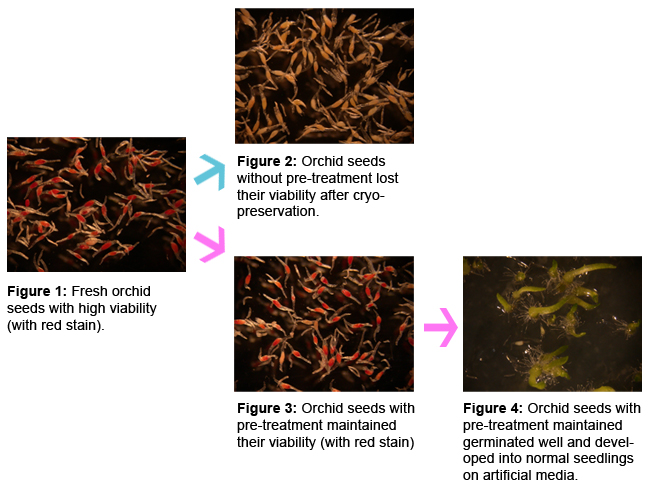Innovative techniques
Because of global environmental changes, extreme weather changes, serious destruction of natural habitats, human predation, illegal logging and unplanned deforestation, a dizzying diversity of wild populations is fast disappearing. Many wild orchids are no exception; they are endangered and face extinction. Therefore, it is imperative to develop long-term preservation technology of orchid genetic resources for sustainable development of Taiwan’s orchid industry and preservation of biodiversity. In this connection, TARI has developed orchid seed storage technology that involves seed pre-treatment and cryopreservation, in which seeds are frozen in liquid nitrogen at minus 197°C for later use. The said technology, which ensures at least 75% of seed viability, is being integrated into the standard operation procedure of orchid seed storage. It also lays the ground for effective mass conservation of orchid genetic resources in the future.
The TARI-affiliated Floriculture Research Center has developed respective cryopreservation methods for the seeds of Phalaenopsis, Phaius, and Taiwan ground orchid (Bletilla formosana). Before cryopreservation, the seeds are pre-treated to lower seed-moisture contents so as to minimize freezing damage to seed tissues by preventing the formation of ice crystals within cells. The whole process is simple, time-saving and without chemical treatments that often damage tissue. Its preservation effects are much superior to the conventional method.
After being frozen for 24 hours in the liquid nitrogen, the seeds are removed, thawed and germinated to develop into normal seedlings on artificial media. The germination rates of the seeds from this cryopreservation method are comparable to those orchid seeds that have been cold stored for 20 years. Altogether, more than 75% of the orchid seeds handled with TARI-developed pre-treatment and cryopreservation methods germinated. By cryopreserving seeds, orchid breeders can store them, without being in danger of losing their genetic integrity, for later use if they have space constraints and are only able to germinate a portion of their seed stock. The said technology is expected to effectively improve the long-term storage of most orchid genetic resources and contributes to the sustainable development of Taiwan’s orchid industry. Besides, the technology could also enable scientists to store endangered orchids for future studies and restoration efforts.


